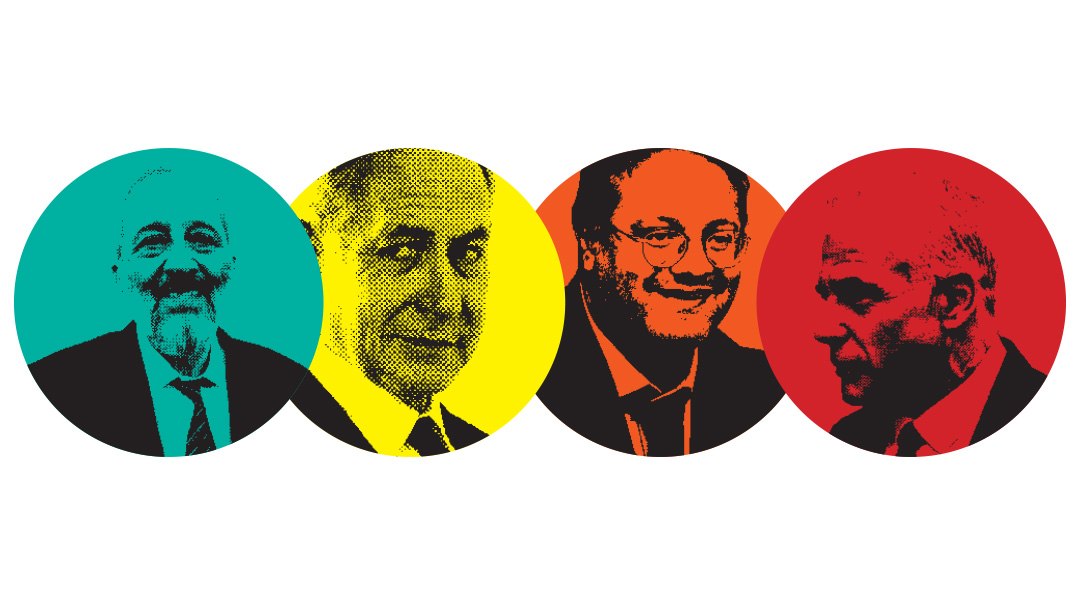Lapid’s New Left
| November 8, 2022Lapid’s long march from un-credentialed outsider to big man of the left has ushered in the Israeli left’s third incarnation

The evening of April 9, 2019, is one Yair Lapid will never forget.
They stood side by side, the four leaders of the fledgling Blue and White party: Benny Gantz, Gabi Ashkenazi, Boogie Yaalon, and he. Three tall, rugged generals and one short, dynamic TV presenter. The quartet celebrated with a group hug after the dramatic exit poll results: Formed less than two months before, the Blue and White party was projected to win 37 seats, well ahead of the Likud.
The mood in the room was electric, overexcited activists breaking into round after round of cheers. Alas, it was not to last. When the actual results started pouring in, it became clear that the exit polls had missed big time and Netanyahu was headed to a fifth term as prime minister (or was he?). But for two glorious hours, the Blue and White HQs were on top of the world.
The party’s candidate for prime minister, former IDF chief of staff Benny Gantz, declared victory to deafening applause. Towering above the audience, he fixed his striking blue eyes on the cameras with his best “statesmanlike” expression, just as expected from the man who was about to replace Binyamin Netanyahu after an uninterrupted decade in power. This was it — the mission was a success.
Everyone cheered, and only Yair Lapid felt that something was missing.
It belongs to someone else, Lapid thought. It belongs to me.
“Not yet,” he reminded himself, in it for the long haul. “Your time will come, Yair.”
In accounts of Israel’s fifth election in four years, Netanyahu’s dramatic comeback looms large.
Less noticed is another story: the near burial of Israel’s historic left, and Yair Lapid’s role as unofficial undertaker at the funeral.
The 25th Knesset will be the first without Meretz representation since the party’s founding in 1992. The Labor Party, which ruled the country for three decades and left a deeper mark on the country than any other party, squeaked over the threshold. For the first time in the history of the state, only four of the Knesset’s 120 seats will be held by the old left.
Whether through foresight or miscalculation, Lapid’s long march from un-credentialed outsider to big man of the left has ushered in the Israeli left’s third incarnation.
Hubris and Nemesis
It’s one of the ironies of Israeli political history that once upon a time, it was the Labor Party that took a hawkish line on security, whereas the forefathers of Israel’s current settler movement were notably dovish.
During his first term as prime minister, Rabin refused to recognize the legitimacy of the PLO and its leader Arafat. But in 1977, he had to make way, and Menachem Begin and the Likud took power in a death blow to Labor’s hegemony.
Over the next few years, the Labor Party — whose initial version was about left-leaning economics as much as a particular foreign policy — evolved rapidly. The socialistic policies they had championed lost their relevance as Begin and the Likud led Israel toward a freer, more liberal economy. The party remained one of the two largest parties in the Knesset, and would return to power a few more times, but under the surface, a new left was rising up, shaped by a very different set of values.
The “peace camp,” as it was called, emerged out of the blue. The pacifists put settlements at the top of their agenda, making it the new demarcation line between right and left. When Rabin returned to power in 1992, it didn’t take him long to understand that the reality he had left behind 15 years prior had changed. The negotiations that paved the way for Oslo took off under his very nose, and Rabin was led into an adventure for which he paid with his life.
The deal exploded in Israel’s face. Terrorism reared its head, and the Labor Party would never regain its former status. It staggered on, the sick old man of Israeli politics, sometimes rising, sometimes falling, but always preserving a measure of relevance — until last week.
And when a vacuum arises, something always emerges to fill it. The Israel left did not disappear, it was replaced. The second left, whose defining issue was peace and concessions to the Palestinians, made way for the new left, which has a very different set of priorities.
It made way for the brand of leftism represented by Yair Lapid.
Take Care of the Roots
On a January morning in 2013, Israelis woke up to a shock. Yair Lapid, a well-known TV presenter and news anchor, had led his new Yesh Atid party to a fantastic result of 19 seats, leaving the Labor Party — also led by a former TV presenter Shelly Yachimovich — in the dust.
Everyone else was shocked, but it didn’t take Lapid long to set his sights on a new goal: “Next time I’ll be prime minister,” he said.
Polls conducted in the aftermath of the elections showed that his ambition was not without basis — if snap elections were held immediately, Yesh Atid was projected to soar to 30 seats and threaten the king of Israeli politics, Binyamin Netanyahu.
But still, it seemed like a pipe dream.
In a country surrounded by enemies, prime ministers were measured by their records. Many were high-ranking generals or officers in the army. Most, like MIT-graduate Bibi, were well-educated.
And Lapid? He hadn’t even completed his bagruyot (Israel’s equivalent of the New York Regents exams). He was seen as unserious, nothing but a puffed-up entertainer.
And there was something else. No centrist party had ever survived more than two elections. Rafi, Shinui, and Kadima — previous centrist parties — had all burst onto the scene with a bang only to die out with a whimper. They had always been formed to answer some specific need that arose, riding a domestic or other issue to success at the polls, only to fade away when the public inevitably lost interest in the subject. There was no reason to think that Yesh Atid’s fate would be any different.
This assumption was wrong, of course. Yesh Atid stayed around, and it doesn’t seem to be going anywhere anytime soon.
That is because Lapid had realized what his forerunners had not: You can’t build a party out of thin air. A party has to be built from the ground up — plant the roots, and it will grow.
From the moment of its founding, the Yesh Atid party built up a massive network of activists. It’s connected to the grassroots on a level unmatched by any other party, with the possible exception of the Likud. It isn’t just another name, but a deeply entrenched movement that represents a broad swath of the Israeli electorate.
Lapid understood something else, as well. If you’re good at something, don’t do it for free. He built up a movement with thousands of activists, but it’s one man’s party. Yesh Atid doesn’t hold primaries. There’s no one to challenge his undisputed leadership. And nothing happens in the party without being vetted by him. The party’s MKs don’t even go on the media without his express permission.
Yesh Atid’s policies reflected the priorities of the new left. In place of the old socialism of Israel’s first decades as a young, impoverished country came Lapid’s 2013 campaign targeting Israel’s struggling middle-class in an aspirational, hi-tech driven economy.
Where once the Palestinian issue was the defining left-right fault line, the former news anchor knew that there was a far more potent issue than rehashing a failed peace deal: the promise of liberalizing the country’s religious status quo.
Under the Bennett-Lapid duumvirate, Yesh Atid’s coalition agreements paved the way for an aggressive assault on the chief rabbinate’s authority. In the crosshairs were the kashrus system, wholesale weakening of the current conversion standards, and civil marriage. With senior representatives in Lapid’s coalition, the Reform movement was given unparalleled access to funding, and only a near revolt staved off a massive expansion of Reform access to the Kosel.
None of that happened overnight. When the four-year-campaign got underway, Lapid had to swallow a lot of humble pie. Despite his tough anti-Netanyahu line, he was unable to gain traction in the polls. As a result, everyone and his brother expected him to give away. Lapid yielded leadership of the Blue and White alliance to Gantz; he allowed Bennett to go first in their rotation deal; he made alliances and acted like a team player. But he still looked after Yesh Atid with a founder’s jealousy.
At the same time, Lapid refused to forge alliances with avowedly leftist parties. He saw what the Labor Party did to everyone who allied with it and wouldn’t touch its — or Meretz’s — purist agenda with a ten-foot pole.
Ahead of the most recent round, he saw the tussling between Labor and Meretz and the split in the Arab parties and understood what was demanded of him — press Meretz and Labor to run together; raise the electoral threshold; take it easy on your allies; what matters is not the size of one party, but the size of the bloc as a whole. Do everything to save Meretz and Labor from obliteration.
But Lapid had other plans.
The Long Haul
The final results represented the left’s worst nightmare: Meretz and the Arab Balad party had both failed to cross the threshold. The Labor Party escaped the same fate by the skin of its teeth. Netanyahu is headed toward a right-religious-chareidi government that can do more or less what it wants. On the left, knives were drawn on Yair Lapid, who led his party to its best-ever result at the expense of the smaller parties in the bloc.
After exit polls projected defeat on election night, Lapid gave a speech to his disappointed supporters: “We grew, while doing our best to save the bloc,” he said.
But not everyone was convinced.
“Lapid didn’t fight,” seethed Labor chairwoman Merav Michaeli. “He finished Meretz, and he almost finished the Labor Party.”
Where the left sees the charred ruins of defeat, Lapid very possibly sees victory. Not just because he made massive gains — picking up seven seats more than he did in the previous round — but because from now on, he’s the undisputed leader of the change bloc, or the new left.
This is a moderate, secular, post-Oslo left that refuses to allow the Arab question to distract it from its real goal — reclaiming the state from the chareidi, religious, traditional “takeover.” To make it a liberal, secular, Western state where religion has little to no place in the public sphere.
This brand of leftism lost the election. Yet in terms of raw votes, it achieved near parity with the right-religious bloc. It will have to sit in the opposition for four long years, but at the end of that period it will get another chance.
And Yair Lapid — the TV presenter who never completed his bagruyot, who never served in a combat position, whom none of the generals took seriously — will be the one leading it.
(Originally featured in Mishpacha, Issue 935)
Oops! We could not locate your form.





